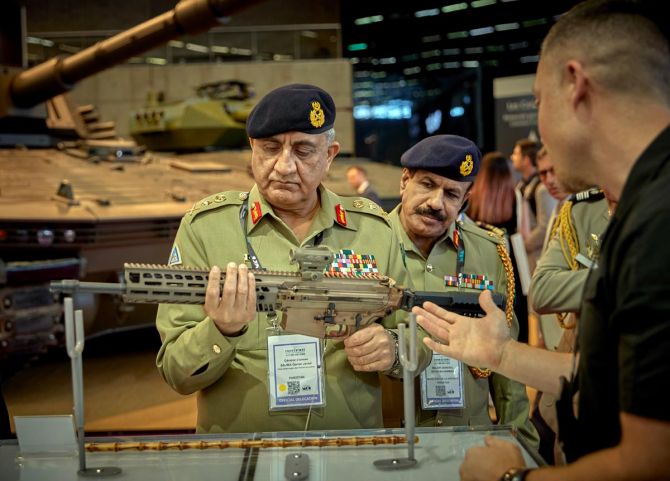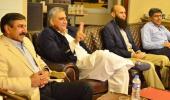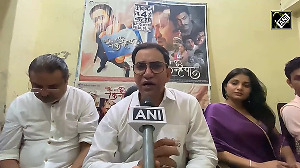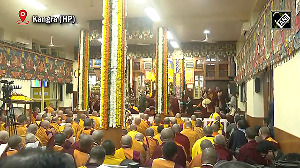Significantly, these 12 officers would form a major part of the team that the new army chief will inherit, observes Rana Banerji, who headed the Pakistan desk at RA&W, India's external intelligence agency.

Twelve major generals were promoted in a somewhat delayed announcement on October 12, in what may be outgoing army chief, General Qamar Javed Bajwa's last reshuffle of two-star and three-star incumbents in the Pakistan army.
It seemed an unusually large number of promotions at one go, but several vacancies had occurred earlier or had been kept in abeyance since October 2021.
After these promotions, the strength of lieutenant generals stands at 30, against a possible sanctioned strength of 28.
Presumably, these would cover the two ensuing four-star retirements -- that of the chief himself and the chairman joint chiefs of staff committee (CJCSC) and the resulting vacancies, which will emerge in November.
Significantly, these 12 officers would form a major part of the team that the new army chief would inherit.
Of the twelve promoted, 3 are from the Armoured Corps, 1 from the Artillery, 2 from Engineers, 1 from Air Defence and 5 from the Infantry -- one each from the Punjab, Sindh and Azad Kashmir regiments and two from Pfiffers (Frontier Force Regiment, FFR).
These broadly follow the seniority list of major generals and weightage gained from important assignments held, which may have figured in the usual professional screening by the army promotion board.
As posts of the engineer in chief and commanding officer, air defence command had fallen vacant, the board had to delve deeper, to accommodate an officer each from the corps of engineers and air defence.
Though nearly 20 major generals have been superseded in this screening, questions have arisen about the unlucky few to have missed out, notably Major General Shahid Nazir, Punjab, who was vice chief of general staff (VCGS-B) at GHQ, the Pakistan army headquarters in Rawalpindi.
One of those lucky to be rewarded is Major General Kashif Nazir, Engineers, DG (Counter Intelligence) in the Inter-Services Intelligence (ISI), who had only recently replaced the controversial Lieutenant General Faiz Hameed henchman there, Major General Irfan Malik, who was named by former PM Nawaz Sharif for ostensible threatening his daughter Maryam Nawaz. He now takes over as the engineer in chief.
After sustained efforts by ousted prime minister Imran Khan to spread dissension among senior serving and retired army officers, announcing the promotions of two star generals first without disclosing full aspects of the reshuffle seemed a play safe measure.
Full details, indicating how important slots of retiring lieutenant generals were being filled, notably those of corps commanders at Mangla, Lahore and director general, strategic plans division (SPD) were not immediately disclosed.
It now becomes evident that Lieutenant General Akhtar Nawaz, FFR, who was chairman of the national disaster management authority, goes as the new II Corps Commander, Multan while Lieutenant General Chiragh Haider, FFR, is shifted from there as inspector general, training and evaluation directorate at GHQ.
Newly promoted Lieutenant General Ayman Bilal Safdar, Artillery, goes to the prized I Corps command at Mangla.
Lieutenant General Salman Fayyaz Ghani, FFR, who was languishing as inspector general, Arms at GHQ is sent as the new IV corps commander, Lahore, with Lieutenant General Fayyaz Hussain Shah, Sindh Regiment, coming in his place.
Another of the newly promoted officers, Lieutenant General Yusuf Jamal, FFR becomes DG, SPD.
Lieutenant General Inam Haider Malik, Engineers, is the new chairman, NDMA, while Lieutenant General Zafar, Air Defence, has been appointed commanding officer, Air Defence.
Lieutenant General Munir Afsar, Punjab, takes over as inspector general, communication and information technology, a post vacant since Lieutenant General Asif Ghafoor was sent to the XII Corps command, Quetta.
Postings of Lieutenant Generals Nauman Zakariya, Ahsan Gulrez and Shahid Imtiaz are yet to become public.
It would seem that these postings have been carefully thought out and discussed among the senior collegiate leadership of generals assisting General Bajwa, so that whoever becomes the new army chief remains in the loop, for choosing his own team after taking charge.
Feature Presentation: Rajesh Alva/Rediff.com











